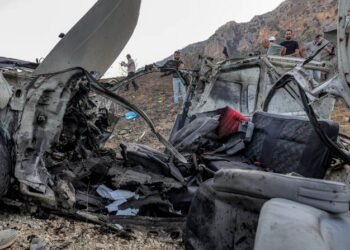By Ghulam Haider
The Pakistani government has been left stunned by Saudi Arabia’s decision to refuse any further bailouts or interest-free loans to the country, as even friendly countries are not willing to support Pakistan’s economic emergency.
Pakistan is facing a severe shortage of US dollar inflows, and without sustained support, it may default on nearly $80 billion of international loan repayments over the next three and a half years. Currently, Pakistan has only $3 billion in foreign exchange reserves, which is not enough to address its financial challenges.
Moreover, Pakistan is struggling to negotiate its 13th bailout package with the International Monetary Fund (IMF) since the 1980s. Failure to reach an agreement with the IMF would further limit the country’s ability to secure international loans. Pakistan’s credit rating has already been downgraded to junk, making it difficult to attract foreign investment.
Analysts familiar with the matter suggest that Saudi Arabia has set strict conditions for providing fresh interest-bearing loans and investment, which include implementing monetary and fiscal reforms and reducing the current account deficit, similar to those set by the IMF.
Umar Karim, an associate fellow at the King Faisal Centre for Research and Islamic Studies, has stated that Pakistani authorities are shocked by Saudi Arabia’s decision. In the past, Saudi Arabia and other Gulf countries would provide Pakistan with financial assistance with a simple phone call from the prime minister or foreign minister.
However, this time around, the Saudis have set stricter conditions and are holding Pakistan accountable for implementing much-needed economic reforms. Even the Pakistani military chief was unable to persuade Saudi Crown Prince Mohammed bin Salman to release emergency funding for the country, indicating a new precedent.
Karim believes that the Pakistani military has previously reassured friendly countries, but Saudi Arabia has had enough of the civilian authorities squandering away handouts. Therefore, Pakistan needs to implement essential reforms to attract foreign investment and address its economic challenges.
The country’s future depends on the successful negotiation of a bailout package with the IMF and the implementation of strict monetary and fiscal policies. Without these reforms, Pakistan may find it increasingly difficult to secure international loans and meet its financial obligations.
New world order
The Saudi government’s decision to withhold any further bailouts or interest-free loans to Pakistan has taken the Pakistani government by surprise and has left them struggling to find a way out of their economic emergency. With almost $80 billion of international loan repayments due in the next three and a half years and foreign exchange reserves of only $3 billion, Pakistan urgently needs sustained US dollar inflows to avoid defaulting on their repayments. However, the country’s credit rating has been downgraded to junk, making it increasingly difficult to secure international loans.
Negotiations with the International Monetary Fund (IMF) over Pakistan’s 13th bailout package since the 1980s are also proving to be challenging. If an agreement is not reached soon, Pakistan will face more difficulties in securing loans.
Analysts have revealed that Saudi Arabia has imposed strict monetary and fiscal reforms, along with a significant reduction in the current account deficit, as conditions for fresh interest-bearing loans and investments. These conditions are similar to those set by the IMF.
Pakistani authorities are in a state of shock as even the Pakistani military chief could not persuade Saudi Crown Prince Mohammed bin Salman to release emergency funding during a recent trip.
Kamal Alam, senior fellow at the Atlantic Council, said that Pakistani authorities should have been more aware of Saudi Arabia’s new policy. Saudi Arabia has reset its relationship with other countries and refused to give financial handouts to Jordan, Morocco, and Egypt. Alam argues that Pakistan, which is more dysfunctional than all of the others, should have anticipated this change.
The country has been lulled by a false sense of security that it is too big to fail, given its population of over 220 million and comprehensive nuclear weapons programme. This has bred complacency across successive governments and the country’s military leadership, resulting in a dependency on easy loans or bailouts.
Khaqan Najeeb, a former adviser to Pakistan’s finance ministry, has stated that Saudi Arabia is demanding that Pakistan sign a deal with the IMF before receiving any loans or investments. The Pakistani government’s delay in implementing essential monetary and fiscal policies has hurt the economic situation. There is also a significant trust deficit between the government and the IMF, which is making sure that Pakistan implements these policies before receiving further funding or the necessary stamp of approval.
Pakistan’s economic situation is becoming increasingly challenging. The rate of inflation is predicted to reach 33 percent in the coming months, and the currency has devalued by almost 65 percent in the last year. Six months ago, the Pakistani government stopped almost all imports to stem the outflow of foreign exchange, leading to a raw materials shortage across manufacturing sectors and the temporary shutdown of several automobile manufacturing plants and textile factories.
With high inflation, slow growth, and high interest rates around the world, there is less money available for emerging markets like Pakistan. Najeeb believes that even friendly Gulf kingdoms will remain hesitant to invest in Pakistan without the IMF’s stamp of approval, as they too want to see essential reforms in the country. However, he believes that an investment model may be better for Pakistan than the previous deposit of a few billion dollars in Pakistan’s state bank.
What to reform and what follows that?
According to Kamal Alam, a senior fellow at the Atlantic Council, it is apparent that the delay in implementing the International Monetary Fund’s (IMF) reforms in Pakistan is due to the government’s deep-seated corruption. He added that zero accountability has destroyed trust in Pakistan’s leadership both at home and abroad. Pakistan is currently ranked 140th on the Corruption Perceptions Index for 2022 by Transparency International, which is not a favorable position for attracting foreign investment, as stated by Alam.
On the other hand, Khaqan Najeeb, a former adviser to Pakistan’s finance ministry, explained that attracting foreign investment alone will not solve Pakistan’s long-term problems. The country needs to broaden its tax base and improve tax collection, as the agriculture, retail, and real estate sectors, which contribute heavily to the country’s GDP, evade taxes.
Umar Karim suggested that the Saudi Arabian government is interested in investing in Pakistan’s energy sector, both in fossil fuels and renewables. He also mentioned that the Saudis are interested in investing in Pakistan’s booming IT sector. However, this investment will only happen if Pakistan implements economic reforms.
Saudi investment in renewable energy could be critical to Pakistan, given the country’s current energy crisis. According to a World Bank report, Pakistan has vast potential for generating electricity through solar energy, and using just 0.071% of the country’s land for solar power generation could satisfy the country’s current electricity demand.
In 2019, the Saudi government expressed interest in establishing an oil refinery and investing $10 billion in Pakistan. However, Najeeb stated that Pakistan needs to revamp its board of investment and provide incentives and specialist human resources to take advantage of this opportunity.
Pakistan’s Prime Minister Imran Khan’s 77-member cabinet, the world’s largest, was also a concern for Umar Karim. He noted that all members of the cabinet receive full perks and privileges, and if Pakistan continues to indulge in such luxuries, the Saudis would not invest in the country’s development.
Najeeb said that a reset in relations with Saudi Arabia could be a wake-up call for Pakistan, and it would be beneficial for the country. Saudi investment could assist in the country’s economic development. However, Najeeb noted that Pakistan must take steps to restore trust with the IMF and implement economic reforms before receiving Saudi investments.







 United Arab Emirates Dirham Exchange Rate
United Arab Emirates Dirham Exchange Rate

